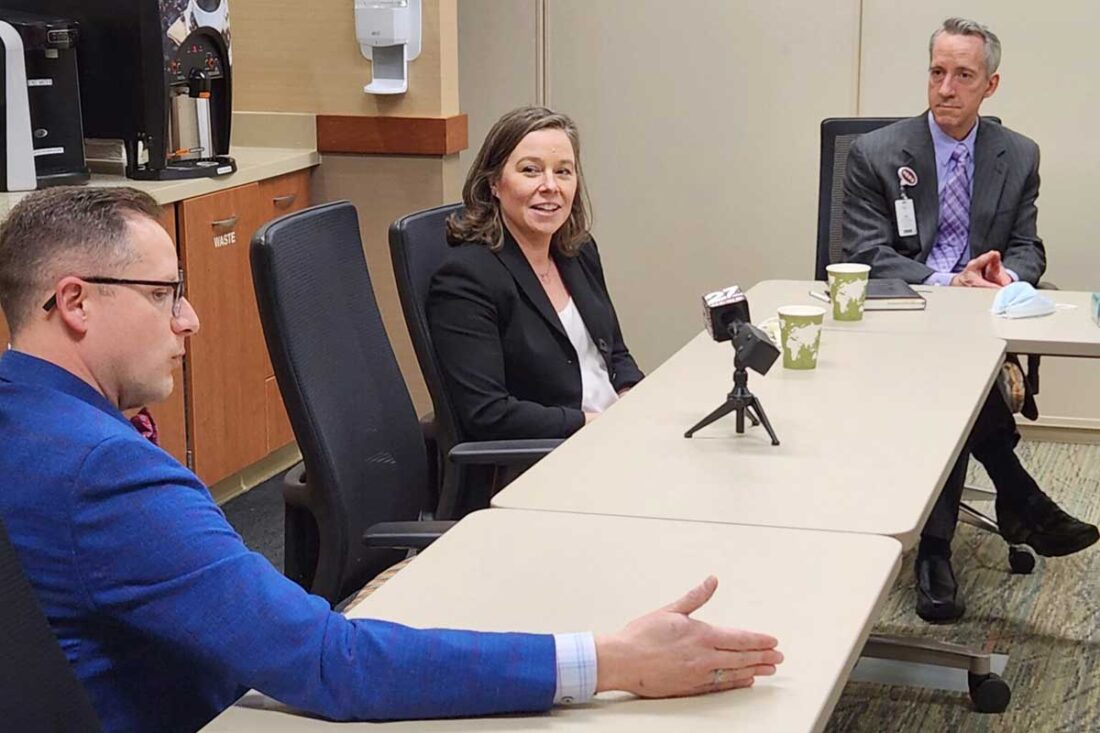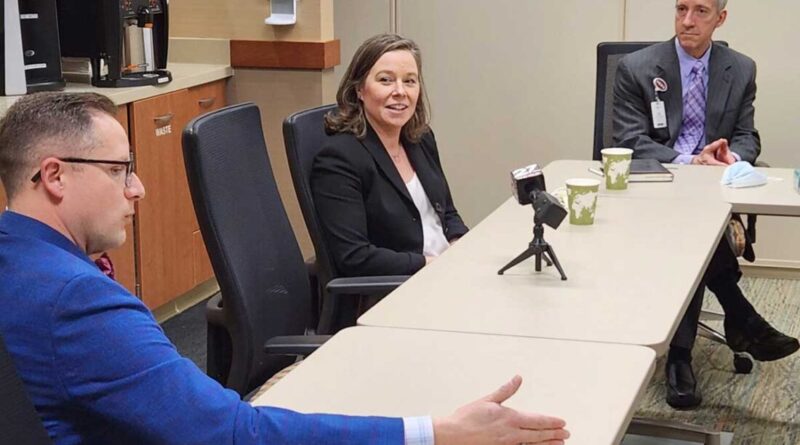A group of health care workers make recommendations

Lt. Gov. Sara Rodriguez said that with the new Legislature taking office in January, elected under Wisconsin’s new electoral maps, she believes lawmakers will show flexibility in considering whether Wisconsin should be the last state to accept the federal Medicaid expansion. Dr. Nathan Grunewald, a urologist who grew up in Sauk County and returned to work at Sauk Prairie Health Care, speaks with Rodriguez about concerns related to recruiting and retaining health care workers in January. (Erik Gunn/Wisconsin Examiner)
Gov. Tony Evers’ Task Force on the Healthcare Workforce released its recommendations on Monday for addressing the state’s health workforce challenges now and in the years to come. The task force’s recommendations sought to address three areas: education and training; recruitment and retention; and control strategy.
Evers created the task force in January after declaring 2024 the Year of the Workers in his state. A 25-member panel of cabinet officials and health care experts has been tasked with making recommendations to help develop health care and workforce plans for the government’s 2025-27 budget.
“Wisconsin has seen historically low unemployment and a record-high number of employed Wisconsinites, but Wisconsin’s decade-long struggle to retain, attract and train talented workers to address the labor shortage in big industries continues to take our country back,” Evers said in a statement. “This action plan will help bring more people into the health care workforce and ensure that Wisconsinites get the care they need and the health they need.”
Evers said that making sure workers can meet the needs of the economy is one of his top priorities “It has to be a priority for our state, including the State Legislature.”
“I look forward to working together and considering these recommendations in the next two-year budget,” Evers said in a statement.
Task Force Chair Lt. Gov. Sara Rodriguez, who worked as an emergency room nurse and in health care and public health policy before entering politics, said at a news conference that Wisconsin could face a shortage of nurses. 20,000 by 2040 and that other sectors in the industry are also facing shortages.
“That includes registered nurses, surgeons, all these types of support that are very important to fill out so that nurses like nurses and doctors … are able to do their work,” Rodriguez said. “That’s where we started from the ground up and looked at what the core issues are that we want to improve within Wisconsin.”
Within education and training, the report recommends improving support for health care faculty by expanding incentive programs for health care educators and increasing compensation for health care faculty. beauty, strengthening medical training and experience, reducing barriers to training, expanding internships and other learning opportunities, providing more national funding for internship programs, funding Development Assistance of Workforce and increase student access to health sciences and dual enrollment, which allows high school students to complete post-secondary education and obtain degrees and certificates.
Rodriguez said he thinks the state Legislature will want to take the initiative to start educational models for nurses.
“We were one of the first states to do that within UW Health with nurses, where they take their certified nursing assistants, pay them full-time wages, full-time benefits , to pay for their schooling, and they will be able to graduate with their registered nursing degree debt-free.” Rodriguez said. “That’s a really good, new way that we can take the research model that Wisconsin has been looking forward to and be able to apply it to the health care workforce.”
The report makes three recommendations to improve recruitment and retention.
One proposal includes more support for recruiting and retaining workers by expanding Medicaid to support health workers and subsidize workforce plans. Part of the proposal will support rate increases to pay for more care for Wisconsinites who are elderly or disabled and for mental health workers. Another proposal increases federal incentives, including loan payments, housing subsidies and provider subsidies, for health professionals who work in federally defined shortage areas. Final proposals would seek to support regional innovation through grants.
The task force also recommended expanding licensure pathways by providing Medicaid reimbursement for doulas, community health workers, peer therapists and other providers who focus on public, verifying and entering into multi-national licensing systems, opening the way to obtain licenses for qualified, internationally educated professionals. updating the educational requirements of the faculty. It also recommends increasing health care worker wellness programs.
Rodriguez said the remaining state budget creates an opportunity to help fund some of the incentives. “If we do this, we will have an economy that works for everyone,” he said.
Rodriguez said the recommendations will go to Evers for a state budget review and to the state budget office, which will create a budget for each recommendation. He also noted that Medicaid expansion could help pay for the proposals.
The state could bring in $1.6 billion in federal funds by approving Medicaid expansion funds, something the Legislature has so far refused to do.
“One of the recommendations we have there is to expand Medicaid for the state of Wisconsin. We are now one of only 10 states that have not expanded Medicaid and we have the unique distinction of being able to just saving on our overall budget if we expand…” Rodriguez said. “We’re not just looking at potential savings, but there’s a lot of savings that could come from expanding Medicaid in Wisconsin that we can invest in our workforce and health system. .”
Republicans in the Legislature have blocked Wisconsin from accepting federal Medicaid expansion, even though Evers has pushed to take state funding since taking office in 2019. In total, Wisconsin would receive $1.6 billion in federal funding. in the next two years the Medicaid coverage cap at 138% of the poverty level.
Rodriguez said that with the new Legislature set to take office in January, elected under Wisconsin’s new electoral maps, he believes lawmakers will show more flexibility when considering whether Wisconsin should to be the last state to accept the federal Medicaid expansion.
———
The Wisconsin Examiner is part of States Newsroom, a national 501(c)(3) nonprofit organization. For more information, visit https://wisconsinexaminer.com.
#group #health #care #workers #recommendations
